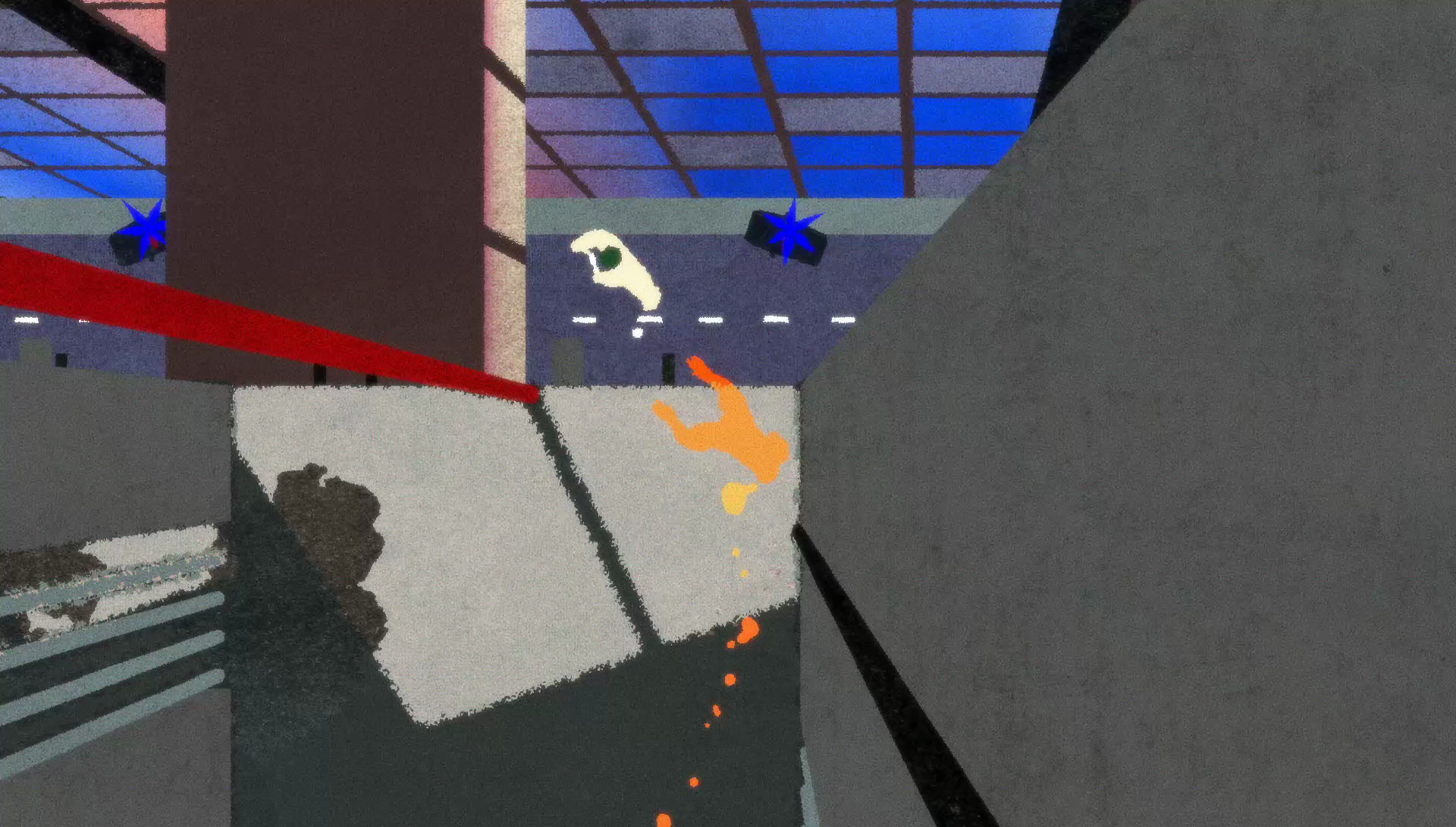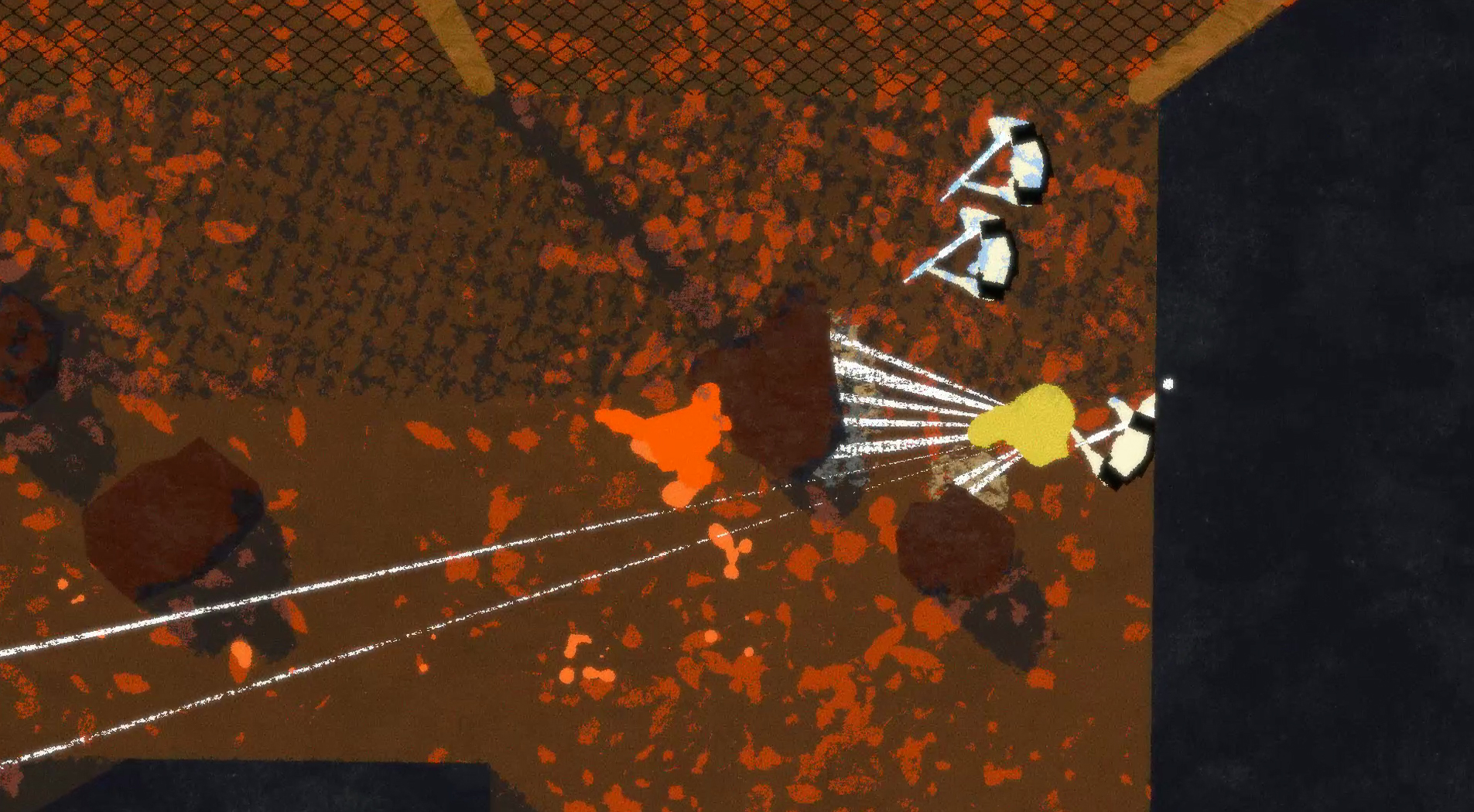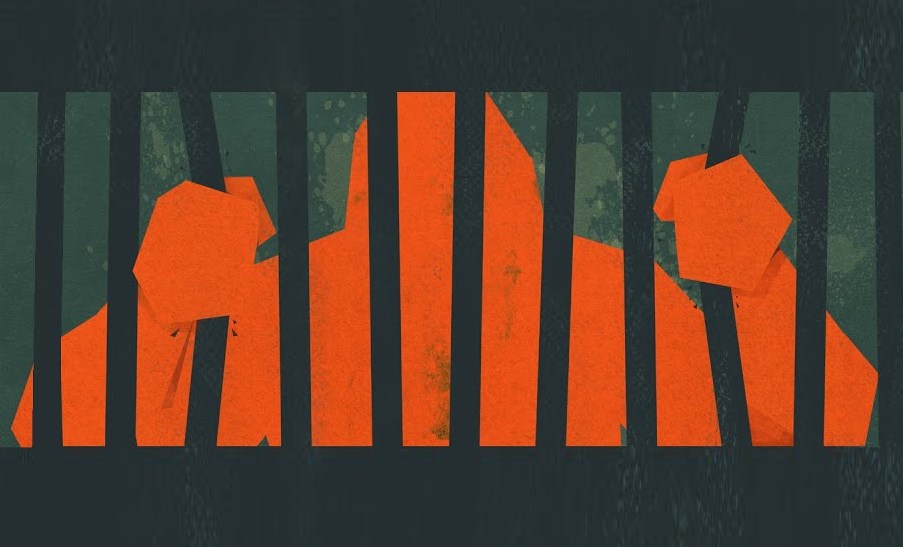Our Verdict
A sensational audiovisual experience that starts to drag around halfway in.
PC Gamer's got your back
What is it? A top-down action game about an ape who's had enough.
Expect to pay $15/£11
Developer: Gabe Cuzzillo, Matt Boch, Bennett Foddy
Publisher: Devolver Digital
Reviewed on GeForce GTX 980, Core i7-6700K, 16GB RAM
Multiplayer: None; but there are Arcade leaderboards
Link: Official site
Buy it: Steam
An ape who wants to escape only has a few options, one of which is shoving her human captors into walls so hard that all the blood flies out of their bodies. That's the plan for Ape Out's ape, and it's pretty much the whole plan. After the first human goes splat, the percussive jazz kicks in, and the dizzying improv violence session is on—just keep running and always be splatting. While Ape Out starts to drag after the first couple acts, it's hard to put down anyway, because it looks, sounds and feels so consistently cool.
As the ape, you charge across procedurally-generated mazes from a top-down view, shoving, grabbing, and tossing the human-shaped enemies in your way. It's like a twin-stick shooter, where one analog stick controls movement and the other rotation, but your guns are your biceps. I preferred the mouse and keyboard controls, where WASD moves and the mouse controls the direction I'm facing, the same way I played Hotline Miami.
Left click shoves enemies with brutal force. Into a wall and they'll splat, and into another enemy of the same size or smaller they'll both splat. With a right click, you can instead grab and hold onto any enemy. Shortly after, they'll fire their weapon away from you, so you can use them to shoot their friends before left clicking to chuck them into walls or each other.
It's a bit funny to go from shoving people into pillars like a high school bully (who's a gorilla) to deliberate, tactical use of a human shield, and that tension between recklessness and planning runs throughout Ape Out. At times it helps vary the pace, but it also relates to Ape Out's biggest flaws.
Arm race
On the reckless side of things, the ape's power is intoxicating. Nothing ever slows you down, nothing can stop your shoves. The biggest enemies splat just as hard as the smallest. A few opportunities for added style are satisfying, too: In one set of levels, you can push enemies out of skyscraper windows, whipping them toward the street with fantastic force.
There's not much time to admire a well-placed shove, though. Ape Out demands snap judgments: I surprise a bomb guy and shove him toward another bomb guy, exploding them at a safe distance from me. Immediately, I have to grab a shotgun guy before he can shoot, spin him around and chuck him at another shotgun guy to block his shot and double-splat them. I ignore a couple riflemen who miss me—they won't catch up if I keep running—smash through a glass pane and shove three more guys into splats along a corridor, because sometimes tactics aren't needed, just ape arms.
As I improvise my way through levels, the jazz percussion improvises along with me, rising to the action and throwing crashes and squeaks and snares and bells in to mark each kill. Ape Out is divided into four eight-level 'albums,' each with its own rhythms and instruments and themes. Together with the stark, unstable color fields that make up the levels, the weird perspective, and the nonsensical, randomized maze layouts, the high-tension music induces the anxiety I imagine in the ape: being an animal in an unfamiliar environment, lashing out against what's hurting me, scrambling and circling back and shoving everything.

Blue notes
Your ape isn't unstoppable, though. When an enemy has a clear shot on you, they'll pause to load and aim, and then take the shot if you haven't dealt with them or turned a corner. It doesn't take many hits to take you down, at which point you have to start over at the beginning of the level.
There are 32 levels, plus one bonus level, and while they aren't exceptionally long, they aren't bite-sized, either, so it's frustrating to die just before the end of one. Completing every level only took me a few hours, but Ape Out felt sluggish by the time I got to the third album. From there, the difficulty feels too dependent on randomization, and many of the levels are disappointingly similar to each other.
I wasn't too impressed when Ape Out added exploding barrels.
There's not much new to learn at that point, either. After my delirious early experimentation, I wondered where this strange game about splats and snare drums was going to go, and I wasn't too impressed when it added exploding barrels. More variety comes from new enemy types, but they're mostly just annoying: flamethrower guys are best avoided, and rocket launcher guys ruin everything if they spawn in too large a number or at an awkward spot. I'm meant to use their weapons to my advantage, but staying alive is hard enough without trying to fancily tease rockets into other enemies.
The procedural generation doesn't help. I can end up at the top of the screen only to find a barrier that extends all the way down to a little gap at the bottom, and then learn on the way there that an inordinate number of enemies spawned along the wall, with too little cover to manage them—another run ended, frustration building. Like Super Meat Boy and Hotline Miami (the first one), Ape Out takes pride in killing you, but dying rarely feels like the learning experience it is in those games. It's just something that happened because I went the wrong way—without any way to know what the right way was, because the level changes every time—or when a rocket squeaked by a corner from behind me.
That focus on failure hinders Ape Out's theme of jazz improvisation. I wanted to be reckless all the time, to play out the angry ape's revenge like an angry ape, but when frustration set in as the levels became more difficult, I started playing more like Solid Snake in an ape costume: cautious, timid, afraid of dying just feet from a level exit again. I'm not sure that strategy worked better, but the distance between checkpoints and my fragility pushed me toward hesitation, especially in the war zone-themed album, where those barrels love exploding in chain reactions. I felt relieved when I finished later levels rather than triumphant, especially when I breezed through one because the randomization was on my side.

Ape on
Now that I've beaten every level and I'm a bit better at making the right decisions, I find Ape Out more enjoyable than I did when I was first trying to progress. I can easily run through the early science facility and skyscraper levels, and with less of my attention dedicated to staying alive, I'm more present for the music, which is fun to tap my keyboard along to.
My favorite level is a special one, though, where the pressure almost completely lifts and I get to run around smashing everything I see, as if my brain has tuned into whatever frequency of background radiation is angry at humanity's crimes. It's a great pay off after the punishment before it, though I'm not convinced it's great because of that punishment—it's more that it was something different when I was craving difference. I wanted to see this simple control scheme and fantastic art applied to lots of different scenarios, not a bunch of ship decks.
Ape Out is so thunderously stylish and thematically strong that I like it even though it loses its thrust so quickly. It evokes anxiety and fear with brutal efficiency, so if you've ever wanted to feel like a cornered animal—or me whenever someone asks me a direct personal question—here's your chance. Those uncomfortable feelings just aren't balanced with quite enough triumph.
A sensational audiovisual experience that starts to drag around halfway in.

Tyler grew up in Silicon Valley during the '80s and '90s, playing games like Zork and Arkanoid on early PCs. He was later captivated by Myst, SimCity, Civilization, Command & Conquer, all the shooters they call "boomer shooters" now, and PS1 classic Bushido Blade (that's right: he had Bleem!). Tyler joined PC Gamer in 2011, and today he's focused on the site's news coverage. His hobbies include amateur boxing and adding to his 1,200-plus hours in Rocket League.


